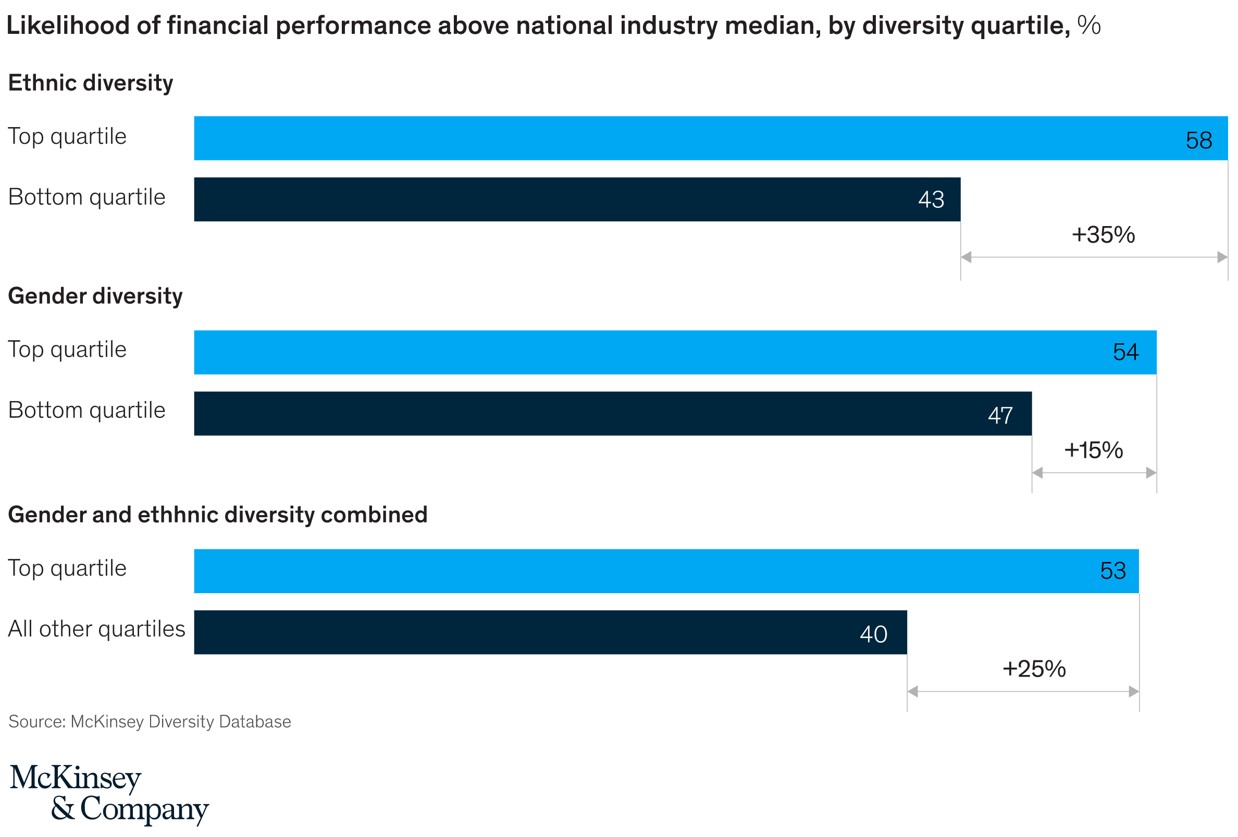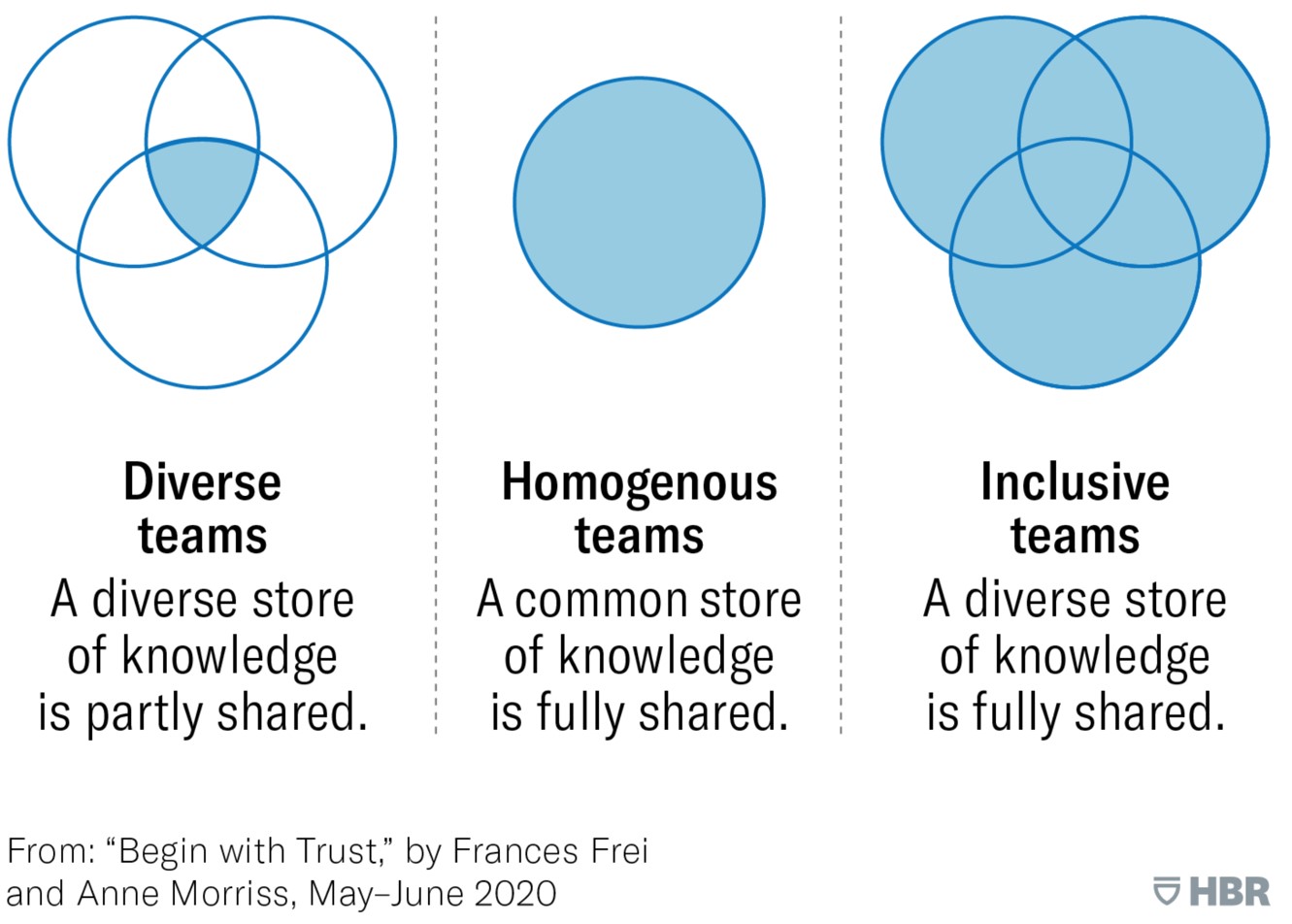
Diversity matters for the success of your business. As McKinsey has shown in their research, diversity correlates with better financial performance:

The concept of “mutual information and knowledge” is central to understanding the positive impact of diversity. Sinan Aral (NYU Stern School of Business & MIT), Erik Brynjolfsson (MIT Sloan School of Management) and Marshall Van Alstyne (Boston University & MIT) explain this well:
- While teams who share significant amounts of mutual information and knowledge may be more harmonious and better able to communicate and coordinate effectively, knowledge homogeneity can reduce learning, creative problem solving and performance
- In contrast, more diverse teams can apply broader, more novel expertise, making it possible for “diversity to trump ability“. Teams with less expertise but more diversity can outperform teams with more expertise but less diversity.
HBR notes that diversity advantage isn’t automatic. The uncomfortable truth is that diverse teams can underperform homogenous teams if they’re not managed actively for differences among members. But if you create conditions that allow team members to bring their unique perspectives and experiences to the table, you can create an unbeatable advantage.

What are the implications for teams?
Diverse teams need inclusive environment to realize their full potential. Team leaders should ask themselves: “Am I maximizing the effects of diversity on our outcomes? Are my team members comfortable being authentic and sharing their unique points of view? Are differences in opinions perceived as a positive attribute of our team?” Leaders have an opportunity to leverage virtual experiences to help team members deeply connect with each other and learn the value of novel perspectives.

Diversity matters for the success of your business. As McKinsey has shown in their research, diversity correlates with better financial performance:

The concept of “mutual information and knowledge” is central to understanding the positive impact of diversity. Sinan Aral (NYU Stern School of Business & MIT), Erik Brynjolfsson (MIT Sloan School of Management) and Marshall Van Alstyne (Boston University & MIT) explain this well:
- While teams who share significant amounts of mutual information and knowledge may be more harmonious and better able to communicate and coordinate effectively, knowledge homogeneity can reduce learning, creative problem solving and performance
- In contrast, more diverse teams can apply broader, more novel expertise, making it possible for “diversity to trump ability“. Teams with less expertise but more diversity can outperform teams with more expertise but less diversity.
HBR notes that diversity advantage isn’t automatic. The uncomfortable truth is that diverse teams can underperform homogenous teams if they’re not managed actively for differences among members. But if you create conditions that allow team members to bring their unique perspectives and experiences to the table, you can create an unbeatable advantage.

What are the implications for teams?
Diverse teams need inclusive environment to realize their full potential. Team leaders should ask themselves: “Am I maximizing the effects of diversity on our outcomes? Are my team members comfortable being authentic and sharing their unique points of view? Are differences in opinions perceived as a positive attribute of our team?” Leaders have an opportunity to leverage virtual experiences to help team members deeply connect with each other and learn the value of novel perspectives.

Diversity matters for the success of your business. As McKinsey has shown in their research, diversity correlates with better financial performance:

The concept of “mutual information and knowledge” is central to understanding the positive impact of diversity. Sinan Aral (NYU Stern School of Business & MIT), Erik Brynjolfsson (MIT Sloan School of Management) and Marshall Van Alstyne (Boston University & MIT) explain this well:
- While teams who share significant amounts of mutual information and knowledge may be more harmonious and better able to communicate and coordinate effectively, knowledge homogeneity can reduce learning, creative problem solving and performance
- In contrast, more diverse teams can apply broader, more novel expertise, making it possible for “diversity to trump ability“. Teams with less expertise but more diversity can outperform teams with more expertise but less diversity.
HBR notes that diversity advantage isn’t automatic. The uncomfortable truth is that diverse teams can underperform homogenous teams if they’re not managed actively for differences among members. But if you create conditions that allow team members to bring their unique perspectives and experiences to the table, you can create an unbeatable advantage.

What are the implications for teams?
Diverse teams need inclusive environment to realize their full potential. Team leaders should ask themselves: “Am I maximizing the effects of diversity on our outcomes? Are my team members comfortable being authentic and sharing their unique points of view? Are differences in opinions perceived as a positive attribute of our team?” Leaders have an opportunity to leverage virtual experiences to help team members deeply connect with each other and learn the value of novel perspectives.



